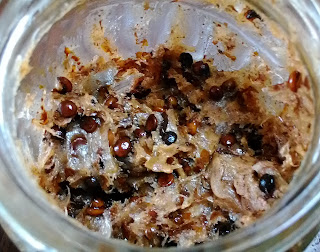Skunk
vine (Paederia scandens). It smells,
er, skunky when we tear its leaves, stems, etc. It seems to me in the US it is
regarded not only as invasive but also fire-hazardous for their forest … Though,
it has very cute flowers during summer. Recently I’ve learned its fruits were
called “Hand cream for farmers’ wife.” One of my seniors for Forest Instructors
Association told me that before Japanese villagers used it when they suffered
frostbites and chapa cracks. I did a little bit of Googling. Yes, traditionally
they have been commonly used for anti-inflammatory medicine especially in tropical area. Japanese also have been very familiar to this plant for more
than millennia. It was called already in the 7th century
Hekuso-kazura = skunk vine. Believe me, Japanese and English denominations are
almost identical for this plant; Hekuso = Skunky, and Kazura = Vine. People
have known the plant somehow useful. In Manyo-shu
万葉集, an ancient collection of Japanese poetry published
around the 7th to 8th century, there is a poem,
さう莢に延ひおほとれる屎葛絶ゆることなく宮仕えせむ 高宮王
Just like Skunk vines clinging to Mysore thorn (Caesalpinia decapetala var. japonica), I’ve determined to work for the office no matter what.… at least, the poet knew utility of the vine, don’t you think?
Prince Takamiya
 |
| Skunk vine fruits in Yokohama, January |
Some researchers are now checking their effects scientifically. Oral intake of (whichever part of) the plant, it seems to me, has no definitive evidence for safety. Topical usage of fruits could be a safer bet as farmers’ wives did. This site reported the seeds contain 9% oil. Out of it, 10% is palmitic acid + oleic acid + linoleic acid, and 20% is sterol … Sounds good for skin. It also contains arbutin and indole which are the chemicals for cosmetics … OK. So, I tried to make a “hand cream” with fruits of skunk vine. Ingredients are simple; thoroughly washed fruits of skunk vines, and Vaseline. It would be easier for you with below photos to see what I’ve done. Here they are:
 |
| This site says the ratio of the fruits and Vaseline is roughly 1 to 5, but it does not specify the unit for the measure. I chose volume, not weight. This is the amount for … |
 |
| 40g
Vaseline. In weight the fruit of the above photo has 32g. |
 |
| I simply mashed the fruit with a pestle. |
 |
| Seeds
for skunk vine were very hard and difficult to grind with a pestle and mortar. I decided to stop pounding at this point, and hoped the component of the seeds oozing out. |
 |
| I mixed the squashed fruits with Vaseline, for |
 |
| the final product. |
Er … you see? It’s difficult to use this mixture as ordinary hand cream carried in our daypack for frequent usage. The mashed skunk vine fruits yield black juice, which makes Vaseline mixture blackish. As a cream to treat chapa cracks, the product could have some effect. I applied it on my fingers and wore gloves for a while. Dried skins of my fingers stopped souring for sure. Though, I’m not sure if this is the effect of Vaseline or skunk vines, and black juice remained between my nails. Let me experiment with this mixture this winter to see what would turn out. By the way, the word for flowers of Skunk vine is “Misanthrope; There is some misunderstanding; Unexpected.” Hmmmmmmmmmmmm.




No comments:
Post a Comment